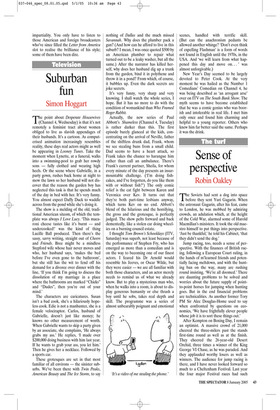Suburban fun
Simon Hoggart
The point about Desperate Housewives (Channel 4, Wednesday) is that it’s not remotely a feminist tract about women obliged to live as slavish appendages of their husbands. It’s a cartoon. As computerised animation increasingly resembles reality, these days real actors might as well be appearing in Looney Tunes. Take the moment when Lynette, at a funeral, walks into a swimming-pool to grab her rowdy sons — fully clothed and wearing high heels. Or the scene where Gabrielle, in a party gown, rushes back home at night to mow the lawn so her husband will not discover that the reason the garden boy has neglected this task is that he spends much of the day in bed with her. It’s very funny. You almost expect Daffy Duck to waddle across from the pond while she’s doing it.
The show is a melding of the old, traditional American sitcom, of which the template was always I Love Lucy. ‘This macaroni cheese tastes like it’s burnt — and undercooked!’ was the kind of thing Lucille Ball produced. Then there’s the sassy, savvy writing, straight out of Cheers and Friends. Bree might be a mindless Stepford wife whose hair never moves and who, her husband says, ‘makes the bed before I’ve even gone to the bathroom’, but she still has the wit to fend off his demand for a divorce over dinner with the line, ‘If you think I’m going to discuss the dissolution of my marriage in a place where the bathrooms are marked “Chicks” and “Dudes”, then you’re out of your mind.’ The characters are caricatures. Susan isn’t a bad cook, she’s a hilariously hopeless cook. Edie is not a manhunter, she is a female velociraptor. Carlos, husband of Gabrielle, doesn’t just like money; he knows no other measurement of worth. When Gabrielle wants to skip a party given by an associate, she complains, ‘He always grabs my ass.’ He replies, ‘I made over $200,000 doing business with him last year. If he wants to grab your ass, you let him.’ Then he gives her a necklace. Followed by a sports car.
These grotesques are set in that most familiar of all environs — the sinister suburbs. We’ve been there with Twin Peaks, American Beauty and The Ice Storm, to say nothing of Dallas and the much missed Savannah. Why does the plumber pack a gun? (And how can he afford to live in this suburb? I mean, I was once quoted $500 by an American plumber to repair what turned out to be a leaky washer, but all the same.) After the narrator has killed herself, why does her husband dig up a trunk from the garden, bind it in polythene and throw it in a pond? From which, of course, it bubbles up. Even the dark secrets are joke secrets.
It’s very funny, very sharp and very knowing. I shall watch the whole series, I hope. But it has no more to do with the condition of womankind than Who Framed Roger Rabbit.
Actually, the new series of Paul Abbott’s Shameless (Channel 4, Tuesday) is rather darker than this. The first episode barely glanced at the kids, concentrating on the arrival of Neville, father of the shiftless drunk dad, Frank, whom we see stealing buns from a small child. Dad seems to have a heart attack, so Frank takes the chance to harangue him rather than call an ambulance. There’s Frank’s current partner, Sheila, for whom every minute of the day presents an insurmountable challenge. (‘I’m doing fishcakes, and I’ve forgotten, do you like them with or without fish?’) The only comic relief is the cat fight between Karen and Veronica over Kev. It turns out that they’re both part-time lesbians anyway, which turns Kev on no end. Abbott’s blend of the hilarious and the horrifying, the gross and the grotesque, is perfectly judged. The show pelts forward and back dementedly, like a stolen car doing wheelies on a burning council estate.
I thought Tom Brown’s Schooldays (ITV, Saturday) was superb, not least because of the performance of Stephen Fry, who has emerged as more than a comedian and is on the way to becoming one of our finest actors. I feared his Dr Arnold would resemble his Jeeves, or Oscar Wilde, but they were easier — we are all familiar with both those characters, and an actor merely needs to remind us of what we already know. But to play a mysterious man who, when he walks into a room, is about to display generous humanity or else thrash a boy until he sobs, takes real depth and skill. The programme was a series of almost unbearably poignant and emotional scenes, handled with terrific skill. (But can the anachronism pedants be allowed another whinge? ‘Don’t even think of expelling Flashman’ is a form of words not found in English until the 1970s, in the USA. And ‘we will learn from what happened this day and move on... ’ was almost unforgivable.) New Year’s Day seemed to be largely devoted to Peter Cook. At the very moment he was hailed as the Number 1 Comedians’ Comedian on Channel 4, he was being described as ‘an arrogant arse’ over on ITV on The South Bank Show. The myth seems to have become established that he was a comic genius who was boorish and intolerable in real life. I met him only once and found him charming and helpful to a young reporter. Others who knew him far better said the same. Perhaps it was the drink.










































 Previous page
Previous page